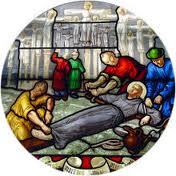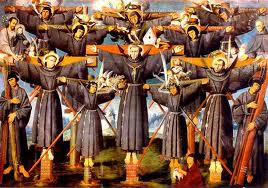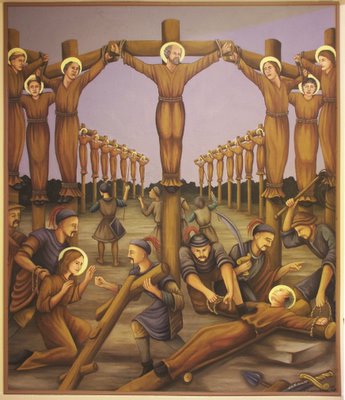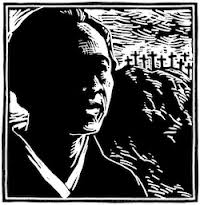
Summary : Ss John Miki and Companions. John Miki was born in 1655 in Japan, entered the Society of Jesus and was a successful preacher of the Gospel. With 26 companions, (63 Jesuits, 6 Fanciscans and 17 Franciscan Tertiaries,) he was tortured and crucified in Nagasaki on 5 Feb. 1597.
 Tertullian is the originator of the phrase:
Tertullian is the originator of the phrase:
“The blood of martyrs becomes the seed of the church“.
Fr John Murray PP reflects on this phrase and looks at some martyrs from Japan and the fruit they gave to the Church. In the past, the Irish Church was always keen to remember the ‘bad old days’, when it was difficult, if not impossible, to practise one’s faith in an open way. The centuries of persecution were indeed extremely difficult, and the list of those who paid for their faith with their lives is legion: Oliver Plunkett, Dermot O’Hurley, Patrick O’Healy, Conor O’Devany and many others. Indeed, between 1572 and 1713, we know of many scores of bishops, priests and lay faithful who met a martyr’s death.
The Church in its calendar also reminds us that there were other countries which suffered similar fates. Indeed, there has hardly been a single country where the faith is lived and celebrated that has not seen some period of persecution and suffering. This month, the Church reminds us of Paul Miki and his companions, whose feast is on 6th February.
Nagasaki
Most people have heard of Nagasaki in Japan. It was there, in August 1945, that an atomic bomb fell, killing as many as forty thousand people. A similar bomb had fallen on Hiroshima a few days before. Within forty-eight hours, Japan surrendered, and the Second World War came to an end.
The destruction of Nagasaki was ironic in many ways, for it was here that one of the main groups of Christians remained. In one fell swoop, it was almost obliterated. Yet, three and a half centuries before, another attempt had been made to do the same.
When St Francis Xavier arrived in Japan in 1549, he was moderately successful in planting the seeds of faith. Other missionaries followed, and a small Christian community began to grow. Initially, the Japanese rulers were open to the new faith, seeing it as useful to establish contacts with Europe and its rich merchants. But by 1596 things had changed, and Toyotomi Hideyoshi, the ruler of the country, outlawed Christianity, ordering the arrest of all believers who refused to deny their faith.
Torture and Martyrdom
The Japanese Catholic writer, Shusaku Endo, in his novel Silence, gives an account of the Shogun methods of getting Christians to deny their faith. A missionary might be captured and imprisoned. Rather than torture him to the point of denial, however, the jailers would torture the prisoner in the cell next to his, and tell him that the screaming would stop only if he denied Christ. What a terrible dilemma! Once the missionary had decided to spare his brother his suffering, he himself could no longer go back to the Christian community as a bona fide priest. He had become an apostate.
 In 1597, twenty-six men were arrested, brought to Nagasaki, and crucified on a hill near the city. Then they were pierced with lances. All of them remained joyful to the end. One of them, the Jesuit Paul Miki, even preached to the crowds gathered beneath the crosses.
In 1597, twenty-six men were arrested, brought to Nagasaki, and crucified on a hill near the city. Then they were pierced with lances. All of them remained joyful to the end. One of them, the Jesuit Paul Miki, even preached to the crowds gathered beneath the crosses.
These are some of his words:
“The sentence of judgement says these men came to Japan from the Philippines, but I did not come from any other country. I am a true Japanese. The only reason for my being killed is that I have taught the doctrine of Christ.
I thank God it is for this that I die. I believe that I am telling the truth before I die. I know you believe me, and I want to say to you all again: ask Christ to help you to become happy. I obey Christ. After Christ’s example, I forgive my persecutors. I do not hate them. I ask God to have pity on all, and I hope my blood will fall on my fellow men as a fruitful rain.”
 Old City of Faith
Old City of Faith
The great early Church apologist, Tertullian, wrote in the second century that “the blood of the martyrs is the seed of the Church”. How true his words have been in so many ages! Many believed that, with the death of Paul Miki and his friends, Christianity would be finished in Japan.
Not so! The centuries passed, and a more favourable climate returned to the country. Missionaries returned in the 1850s. Some French priests established a mission in the old city of faith, Nagasaki.
At first, they did not see any signs of Christianity. Then, one day, they were visited by an old man, who asked them three questions. Did they venerate Mary, the Mother of God? Were they married? And did they follow the Pope in Rome? When they answered to their satisfaction, the “hidden Christians” of Nagasaki emerged into the open.
Somehow, the Catholics of Nagasaki had lived their faith without priests, as best they could. They had not dared to keep any written materials but, like the early Church, had passed on their faith by word of mouth. The blood of Paul Miki and his friends had indeed fallen on fruitful ground.
Fidelity
The story of a martyr is a story of God’s fidelity. God, who is faithful, will never abandon anyone. The martyr knows this, and is prepared to let go of his life, trusting he will regain it eternally. God, who is faithful, will not allow the faith to die, but will raise it up in a new generation of believers.
The people of Ireland knew this in the centuries of our persecution. The martyrs of Uganda and Vietnam knew it in the nineteenth century, and the people of Mexico knew it in the twentieth century. The lives and deaths of Ignatius of Antioch, Polycarp of Smyrna, Justin of Rome and countless other early Church martyrs witnessed to Christ by their blood.
 Remember to pray for those persecuted for their faith today, whom we read about in the Catholic press occasionally. We can think of the Christians in the Sudan, in Iraq, in Afghanistan or in other parts of the world.
Remember to pray for those persecuted for their faith today, whom we read about in the Catholic press occasionally. We can think of the Christians in the Sudan, in Iraq, in Afghanistan or in other parts of the world.
Today, in Ireland, persecution no longer leads to the shedding of blood. It is more subtle and difficult than that. May our faith shine through, just like that of the Christians of Nagasaki, for God is always faithful.
This article first appeared in The Messenger (February 2006), a publication of the Irish Jesuits. c/f www.messenger.ie/bookshop/